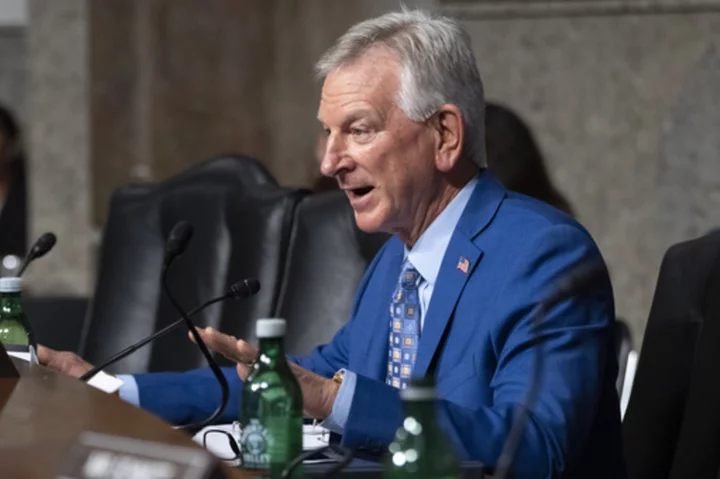WASHINGTON (AP) — Republican senators are holding a meeting Tuesday to confront Alabama Sen. Tommy Tuberville about his blockade of almost 400 military nominations, an effort to find a path forward as the senator has dug in on his protest of a Pentagon abortion policy.
The unusual meeting called by GOP senators to challenge one of their own comes after a handful of Senate Republicans held the floor for more than four hours last week in frustration, calling up 61 of the military nominations only for Tuberville to stand up and object every time. The Senate has traditionally approved large groups of military nominations by voice vote, but just one senator’s objection can upend that process.
Republicans said they will continue to try to negotiate with the Alabama Republican — hoping to persuade him to hold up civilian nominees instead, or maybe even take legal action — and have said they will also try to force more votes on nomination.
They are holding the meeting as Democrats are considering a resolution that would allow batches of military nominees to be passed over Tuberville’s objections — a temporary measure that Republicans worry could erode their minority powers in the Senate.
Sen. Jack Reed’s resolution to provide for batch consideration of military nominations will be before the Senate Rules Committee next week. Reed said he believes that if the impasse isn’t resolved by then, a “number of Republicans will be ready to support the resolution.”
Senate Majority Leader Chuck Schumer has said that “patience is wearing thin” with Tuberville’s nine-month-old blockade and that Democrats “will do everything we can to get it done.”
Tuberville said before last week’s floor debate that there was “zero chance” he would lift his holds on the military nominees, which he first announced in February. But he said this week that he is open to listening, at least, to his colleagues.
“Hopefully we’ll come up with something that’ll work,” Tuberville said on Monday evening, adding that there was zero chance he would drop his holds “until we get a solution.”
On Tuesday, just before the meeting, he said, ”We’re going to talk about several options today. I know people are getting inpatient, as am I.”
Senior military officials have warned repeatedly that the situation threatens readiness and national security. Defense Secretary Lloyd Austin said last week that the delays are hurting readiness and have “unnecessarily weighed down our military families, who already give up so much to support those who serve.”
Tuberville is holding up the nominees over a Pentagon policy of paying for travel when a service member has to go out of state to get an abortion or other reproductive care. President Joe Biden’s administration instituted the new rules after the Supreme Court overturned the nationwide right to an abortion, and some states have limited or banned the procedure.
“I cannot simply sit idly by while the Biden administration injects politics in our military from the White House and spends taxpayers’ dollars on abortion,” Tuberville said last week as his GOP colleagues confronted him.
The Republican senators have all said they disagree with the abortion policy, as well. But they argued that Tuberville’s protest is misguided.
“It’s time to develop a new and smarter strategy,” said Republican Sen. Todd Young of Indiana, who served in the Marine Corps and was one of the senators who criticized Tuberville’s blockade on the Senate floor.
Leading the confrontation on the Senate floor last week were Alaska Sen. Dan Sullivan, a colonel in the U.S. Marine Corps Reserve, and Iowa Sen. Joni Ernst, a former commander in the U.S. Army Reserve and Iowa Army National Guard. The two Republican senators read out the officers’ credentials, praised their military service and lashed out at Tuberville as he sat quietly and alone, standing to object each time. At one point, Sullivan called the blockade a “national security suicide mission.”
“Why are we taking hostages that can’t change the policy?” Ernst asked afterward.
South Dakota Sen. John Thune, the No. 2 Republican in the Senate, said he hopes that Republicans have a path forward coming out of the conference.
"What he’s trying to accomplish here, we agree with him,” Thune said. “But the question is how you get there.”

